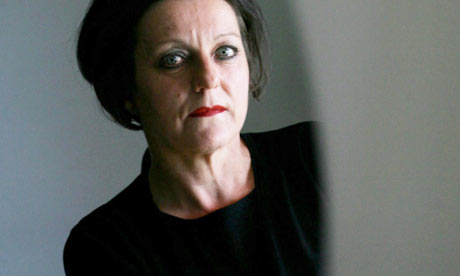- The 2009 Nobel prize has been awarded to Herta Müller, for depicting the 'landscape of the dispossessed' with 'the concentration of poetry and the frankness of prose'
- guardian.co.uk, Thursday 8 October 2009

The winner of the 2009 Nobel prize for literature, Herta Müller. Photograph: Jack Mikrut/ EPA
Romanian-born German novelist, essayist and poet Herta Müller has been named winner of the 2009 Nobel prize for literature, praised by the judges for depicting the "landscape of the dispossessed" with "the concentration of poetry and the frankness of prose".
Müller becomes only the 12th woman to have won the Nobel since it launched in 1901; in 2007 British novelist Doris Lessing won for her "scepticism, fire and visionary power ... [which] subjected a divided civilisation to scrutiny". In a statement this afternoon Müller said she was "delighted" by the award, and "still couldn't believe it".
Worth 10m Swedish kronor (£893,000), the Nobel is awarded to "the person who shall have produced in the field of literature the most outstanding work in an ideal direction", as described in Alfred Nobel's will of 1895.
According to the permanent secretary of the Swedish Academy, Peter Englund, Müller's "moral momentum" means she fits the criteria for the award "perfectly".
"On one hand she's an excellent author with truly fantastic language," he said, "and on the other she has the capacity of really giving you a sense of what it's like to live in a dictatorship, also what it's like to be part of a minority in another country and what it's like to be an exile."
Englund also praised Muller's "extreme precision with words". "She has been living in a dictatorship which constantly misused and abused language, and this has forced a sort of scepticism in her regarding the use of words, the use of language," he said. "She has a very, very fine-tuned precision in her language."
He advised readers new to Muller to start with her novel Herztier (published in English as The Land of Green Plums), which he said many considered to be her best novel. Her latest novel, Atemschaukel (Everything I Possess I Carry With Me), was "absolutely breathtaking," he added.
Born in Romania in 1953, Müller refused to cooperate with Ceausescu's Securitate, lost her job as a teacher and was the subject of repeated threats until she emigrated in 1987. She now lives in Berlin, where she has been the recipient of a multitude of literary awards, including Germany's most prestigious, the Kleist prize, the Frankz Kafka and the 100,000 euro (£85,000) Impac award for Hertzier. The story of five young Romanians living under Ceausescu's dictatorship, Müller has said that she wrote it "in memory of my Romanian friends who were killed under the Ceausescu regime", and that she "felt it was my duty". The New York Times called it "a novel of graphically observed detail in which the author seeks to create a sort of poetry out of the spiritual and material ugliness of life in Communist Romania".
Although Müller left Romania over 20 years ago, she returns constantly to the themes of oppression, exile and dictatorship in her novels and poems, which also include The Appointment, about a young woman during Ceausescu's regime who works in a clothes factory, and sews notes into the suits of men bound for Italy, saying "marry me". Der Fuchs war damals schon der Jäger, published in English as The Passport, follows the story of a village miller in a German-speaking Romanian village, who applies for permission to emigrate to West Germany. Published in August, Atemschaukel follows a 17-year-old boy who is deported to a Ukrainian labour camp. Shortlisted for the German book prize, the Frankfurter Allgemeine Zeitung called it "phenomenal, moving and humbling novel, perhaps the most memorable read of the autumn".
"The most overwhelming experience for me was living under the dictatorial regime in Romania. And simply living in Germany, hundreds of kilometres away, does not erase my past experience," Müller has said. "I packed up my past when I left, and remember that dictatorships are still a current topic in Germany."
Pete Ayrton, who has published Müller in translation at Serpent's Tail, said he was "absolutely thrilled" at the news. "It's terrific and I think it shows the Nobel prize are doing their job to bring the writings of wonderful, neglected writers, who are underappreciated in the Anglo Saxon world, to our attention" he said. "She is from the German minority in Romania and from that experience, she writes extraordinary accounts of being an ethnic minority in a totalitarian regime. But this is not overtly political writing; it's very poetic and elliptical. She's an extraordinary writer."
The Nobel prize winner is selected by 18 members of the Swedish Academy, who receive around 200 nominations at the start of the year, whittling this down to a secret shortlist of five and then choosing their winner, who must receive more than half of the votes cast. Müller becomes its 106th winner; last year French novelist JMG Le Clézio won, cited for his "new departures, poetic adventure and sensual ecstasy", and for exploring "a humanity beyond and below the reigning civilization".
Thursday, October 8, 2009
Herta Müller takes Nobel prize for literature
Subscribe to:
Post Comments (Atom)
No comments:
Post a Comment